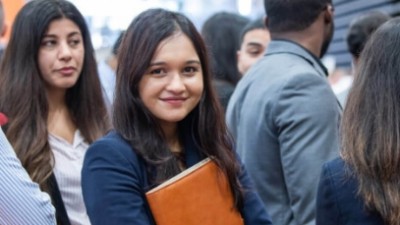RIT to co-hosts circular economy symposium in Jakarta with U.S. State Department
Saunders and Golisano faculty to launch project advancing circular economy entrepreneurship and smart technologies in Southeast Asia
Rochester Institute of Technology is collaborating with the US State Department, the US-ASEAN (Association of Southeast Asian Nations) Smart Cities Partnership, and Arizona State University to host a Symposium on Accelerating Science, Technology, and Circular Economy in Southeast Asia, in Jakarta, Indonesia, September 5-7, 2023. The Symposium has three tracks: smart sustainable cities; cooperation in science, technology, and innovation; and circular economy entrepreneurship. The last of these, circular economy entrepreneurship, was organized by Clyde Eiríkur Hull, professor of management in Saunders College.
“This symposium,” says professor Hull, “is bringing entrepreneurs, people who teach and work with entrepreneurs, business leaders, university faculty, and policymakers together to work together to help the ASEAN economies grow while reducing environmental impact. It's a rare chance to work with the U.S. Department of State, our funder, Arizona State University, the Japanese government, and the Economic Research Institute for ASEAN and Asia to make an impact in the ‘real world.’ One great example of an established company doing that is Jones & Vining, under the leadership of RIT alum Jim Salzano.”
The session “Circular Economy Entrepreneurship” (September 7) will feature presentations by Saunders College faculty Hull and Israa Thiab, visiting assistant professor; Eric Williams, professor of sustainability, Golisano College, with PhD student Shenying Zhang; and Saunders alumnus Jim Salzano ’87 (public accounting), CEO, Jones & Vining.
Professor Hull is principal investigator and Williams co-PI of a program, “ASEAN Circular Entrepreneurship Training,” funded by the United States Department of State in partnership between the U.S.-ASEAN Science, Technology and Innovation Cooperation (STIC) Program and the U.S.-ASEAN Smart Cities Partnership (USASCP). The project involves working with partners throughout the ASEAN region to “promote more circular business, sustainable economic development, and environmental stability” through training of trainers of entrepreneurs. Professor Thiab is also a part of this project.
“ASEAN Circular Entrepreneurship Training” consists of three parts: 1. assessing e-waste in the ASEAN region from a circular entrepreneurship perspective, 2. recruiting partners across the ASEAN region to deliver the curriculum, and 3. working with each partner to ensure that they have a version of the curriculum that works for them.
Relating to this work, Saunders College now houses the Competitive Sustainability Center, administered by Professor Hull. The center “leverages the strengths of both the college, and RIT, to help new and existing businesses, non-profits, and government agencies find and pursue competitive sustainability opportunities.” It will officially launch in fall 2023.
Professors Williams, Hull, and Thiab recently spent two years working with female entrepreneurs in Jordan. They found it is possible to recruit and train entrepreneurs to recognize, pursue, and profit from circular opportunities. With nine startups having gained admission to one of the best business incubators in Jordan and the project wrapping up, the team has moved on to developing and sharing their curriculum with partners so as to scale up and reach large numbers of entrepreneurs. They have developed short and medium-length training programs, as well as a full-semester university course on circular entrepreneurship, which is being offered on the RIT campus this fall, taught by Professor Thiab. Over two-thirds of the students in this course are ASEAN.
“ASEAN Circular Entrepreneurship Training” will officially kick off at the Symposium.
Says Hull of the conference, “I expect our ties with our ASEAN partners will be stronger after this event, and I look forward to seeing what other results -- maybe more new circular-economy companies or new circular-economy ventures in existing companies -- come from this symposium.”











